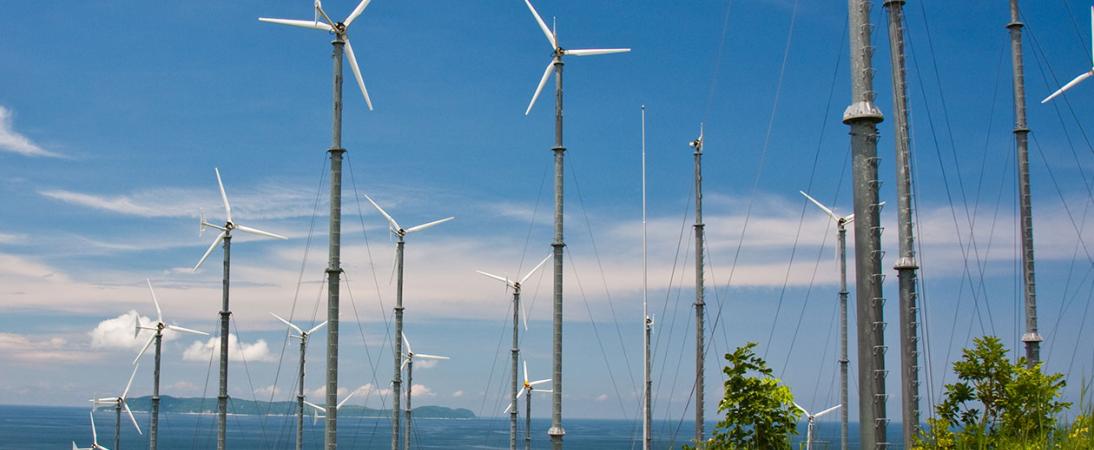Innovations

Islands Energy Program
Working to solve the toughest energy challenges
With an independent, objective, and fact-based approach, the Islands Energy Program (IEP) brings experience gained from engagements with island governments, utilities, and civil society to solve the toughest energy challenges. The program is working with island partners to develop clean energy pathways to meet national goals and development objectives. They are primarily focused on solar energy and battery storage to design a new national energy transition strategy to decentralize electricity and eliminate the current single point of failure.
The problem
Islands have a high dependence on fossil fuels and with that suffer high electricity costs, volatile global oil prices, and a reliance on imported diesel. Yet, island nations possess abundant local and natural resources, such as wind, sun, and in some cases geothermal potential, which can be harnessed to provide low-cost, clean, affordable, local energy.
The solution
By using local resources, entire countries can be powered by clean energy. The Islands Energy Program (IEP) of the Rocky Mountain Institute (RMI) aids island nations to transition from expensive and dirty energy sources to clean, affordable, and more resilient energy systems. The program operates on three pillars:
- holistic energy planning,
- project and program advisory and
- energy leadership.
How it Works
First, IEP convenes stakeholders to develop a national holistic energy transition plan. Second, they help develop, de-risk and prepare clean energy projects for market in order to attract top project developers and companies. Lastly, they connect island energy practitioners with experts in the sector through an online community where they can exchange lessons and learn from one another. The primary focus within the holistic energy plans is to decentralize the island’s energy production away from fossil fuel based sources to solar energy and battery storage. Solar energy marks the first step in unlocking energy transition, which later is integrated with wind energy and overall energy efficiency. Taken together, these three components become the drivers of innovation and transition speed.
Goals
- To enable islands to go to the root of the problem and be clean economies.
- Reduce electricity costs for residents and businesses
- Maintain high reliability of everyday electricity service
- Improve resilience to extreme weather events
- Have islands become more sustainable while fostering economic development
- Utilize more local renewable energy resources and less imported fuel
Challenges
- A decentralized power supply requires government, business and communities to all come together and be fully engaged in the process. Merging all these sectors can be challenging
- It crucial to ensure that the benefits of energy transition are equitably distributed. This depends upon the regulatory framework and business utility model that is ultimately implemented — depending on local context, this can be a challenge.
More information
Interview conducted with Justin Locke of the Rocky Mountain Institute. For more information, visit https://rmi.org/wp-content/uploads/2019/05/rmi-islands-energy-statement…
Impacts to Date
- On several islands the program has driven down the cost of solar by 300% and is now commercially viable and financed.
- Facilitated the implementation of 17 projects totaling over 75 MW spread across 8 island nations that are either under construction, under procurement, or plan to be tendered.
- Worked with development partners and commercial lenders to leverage $160 million in private and public sector clean energy investment.
- Led the clean energy transition planning process and supported the development of roadmaps for six islands to build low-carbon futures: the British Virgin Islands, the Turks and Caicos Islands, San Andrés and Providencia, Belize, Saint Vincent and the Grenadines, and Saint Lucia.
- Collaborated with the Institute for Competitiveness and Sustainable Economy for Puerto Rico (ICSE-PR) and convened over 40 energy stakeholders who provided a collaborative approach toward a vision for reforming the Puerto Rico energy system.
- Developed a set of guidelines for governments, utilities and insurance providers to design and construct solar PV ground mount systems to be Category 5 hurricane resistant.
- Co-authored The Bahamas renewable energy net-billing and interconnection policy and the Montserrat National Energy Policy.
- Launched an online knowledge exchange community for island energy practitioners, which has grown to over 1,100 members.
- Conducted over 25 utility-focused webinars, 8 live training workshops and two annual renewable energy and smart grid conferences designed for members to convene in person and share knowledge.
- RMI continues to assist partners in the development of knowledge exchange activities. The CAREC community is a knowledge exchange platform and community of practice developed in cooperation with RMI’s partner in the region; the Caribbean Electric Utilities Services Corporation (CARILEC). CAREC is fully owned and operated by CARILEC and is designed to enhance capacity strengthening and sharing in the Caribbean region. The Community members are from across the globe.
